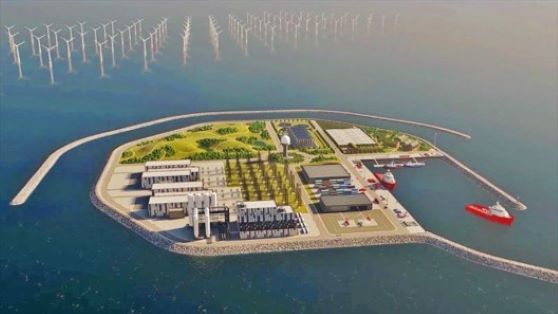
We have developed an innovative model enabling the planning of an optimal energy island. The model makes it possible to generate scenarios and explore how to plan for the maximum economic returns for investors and developers. By analyzing various scenarios we can assess how differing conditions might affect the island’s operations, capacity, investment, and profitability.
Correspondingly, the model can generate scenarios showing the optimal scale of production of various e-fuels such as hydrogen, ammonia, methanol, and kerosene. Likewise, we can probe the most cost-efficient solutions for the management of electricity transmission.
The model is the result of a master’s thesis that we have supervised. It’s developed using the TIMES modelling framework and diverges from the prevalent demand-driven approach by adopting a price-driven strategy.
North Sea Energy Island
As a case study, the master’s thesis explores the strategic development and optimization of a North Sea Energy Island. The Danish government is planning for several energy islands in the North Sea. The Energy Island project directly addresses the European Union’s imperative to boost energy security and diminish its dependence on
fossil fuel imports amidst evolving geopolitical and energy market dynamics.
The model employs an hourly resolution. It thus provides a detailed understanding of the island’s configuration and operations, enhancing the reliability of the results.
The developed model tool has proven reliable although some simplifications concerning the electricity market and transport operations were necessary. It can be integrated with other demand-driven studies to determine optimal operational strategies and future projections.
Results
The findings indicate that Germany and Denmark are the most viable markets for exporting the island’s electricity. However, producing hydrogen for export to the Netherlands and Belgium appears to be the most lucrative option, given the high industrial demand and pricing in these regions.
The study also notes that producing other e-fuels on the island would be economically feasible only under specific conditions with sufficiently high prices. These results suggest that the island’s most effective role may be as a hydrogen hub.
Furthermore, using an hourly resolution has proven instrumental in understanding storage operations on the island and achieving more dependable outcomes.

Modelling
We have developed a model of a North Sea energy island using the TIMES modelling framework.

Scenarios
We have generated various scenarios and assessed how differing conditions might affect the island’s operations, capacity, investment, and profitability.

Publication
The research is part of a master’s thesis at Danish Technical University.
Institution: Danish Technical University, supervisor Kenneth Karlsson
MSc student: Francisco González Beltrán
EML-team: Kenneth Karlsson, and Till ben Brahim
Duration: 2023-2024
